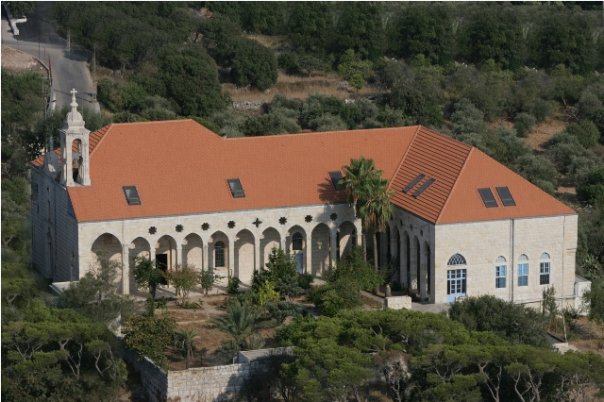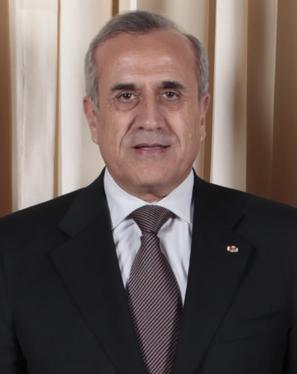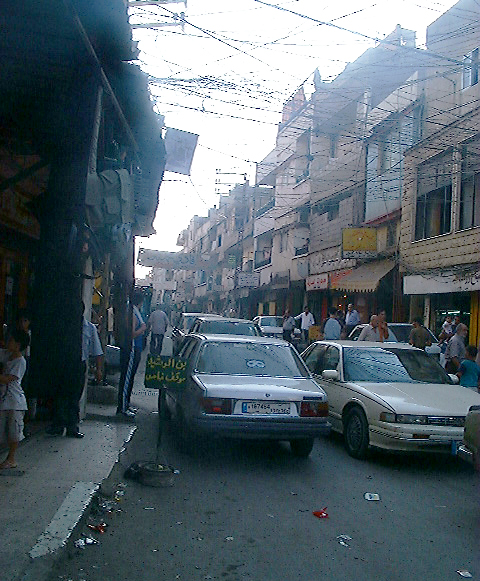|
Michel Suleiman
Michel Suleiman ( ar, ميشال سليمان ; born 21 November 1948) is a Lebanese Maronite Christian politician who served as President of Lebanon from 2008 to 2014. Before becoming president, he served as commander of the Lebanese Armed Forces from 1998 to 2008. After Lebanese Armed Forces (LAF) commander Émile Lahoud took office as president in November 1998, Suleiman succeeded him, taking his place in December. Suleiman was later elected President and was sworn into office on 25 May 2008. Early life and education Suleiman was born in Amsheet in a Maronite Christian family on 21 November 1948. He joined the Lebanese Armed Forces in 1967 and went on to graduate from the military academy as 2nd lieutenant in 1970. He holds a Bachelor of Arts in politics and administrative sciences from the Lebanese University. During his military career, he participated in several military training courses : * Officer course, Military school, Lebanon, 1970 * Advanced training course, 7 Janu ... [...More Info...] [...Related Items...] OR: [Wikipedia] [Google] [Baidu] |
Excellency
Excellency is an honorific style given to certain high-level officers of a sovereign state, officials of an international organization, or members of an aristocracy. Once entitled to the title "Excellency", the holder usually retains the right to that courtesy throughout their lifetime, although in some cases the title is attached to a particular office, and is held only for the duration of that office. Generally people addressed as ''Excellency'' are heads of state, heads of government, governors, ambassadors, Roman Catholic bishops and high-ranking ecclesiastics and others holding equivalent rank (e.g., heads of international organizations). Members of royal families generally have distinct addresses (Majesty, Highness, etc.) It is sometimes misinterpreted as a title of office in itself, but in fact is an honorific that precedes various titles (such as Mr. President, and so on), both in speech and in writing. In reference to such an official, it takes the form ''His'' or ... [...More Info...] [...Related Items...] OR: [Wikipedia] [Google] [Baidu] |
Wafaa Sleiman
Wafaa Sleiman (born 20 June 1952) is the former First Lady of Lebanon from 2008 to 2014 and the wife of President Michel Suleiman. Personal details Wafaa Sleiman was born in Amsheet, Lebanon, on 20 June 1952. She obtained a bachelor of science degree in Teaching and Education from the Teachers Training College in 1970, then later obtained a bachelor of arts degree in philosophy from the Lebanese University in 1973. She married Michel Suleiman in the same year. They have three children: Rita (born in 1975), Lara (born in 1978) and Charbel (born in 1983). Honours * Spain: ** Dame Grand Cross with Collar of the Order of Isabella the Catholic The Order of Isabella the Catholic ( es, Orden de Isabel la Católica) is a Spanish civil order and honor granted to persons and institutions in recognition of extraordinary services to the homeland or the promotion of international relations a ... References External links {{DEFAULTSORT:Sleiman, Wafaa 1952 births First ladies ... [...More Info...] [...Related Items...] OR: [Wikipedia] [Google] [Baidu] |
Maronite Christianity In Lebanon
Lebanese Maronite Christians ( ar, المسيحية المارونية في لبنان; syc, ܡܫܝܚܝ̈ܐ ܡܪ̈ܘܢܝܐ ܕܠܒܢܢ) are adherents of the Maronite Church in Lebanon, which is the largest Christian denomination in the country. The Maronite Church is an Eastern Catholic Church in full communion with the worldwide Catholic Church. The Lebanese Maronite Christians are believed to constitute about 30% of the total population of Lebanon according to election results. Lebanon's constitution was intended to guarantee political representation for each of the nation's ethno-religious groups. The Maronite Catholics and the Druze founded modern Lebanon in the early eighteenth century, through the ruling and social system known as the " Maronite-Druze dualism" in Mount Lebanon Mutasarrifate. Under the terms of an unwritten agreement known as the National Pact between the various political and religious leaders of Lebanon, the president of the country must be a Maronite. ... [...More Info...] [...Related Items...] OR: [Wikipedia] [Google] [Baidu] |
Amsheet
Amsheet (, '; also spelled Amchit) is a seaside town and municipality in the Byblos District of Keserwan-Jbeil Governorate, Lebanon, about 40 km north of Beirut. The town's average elevation is 140 meters above sea level and its total land area is 595 hectares. Its inhabitants are predominantly Maronites, although there is a Shia Muslim minority. There are many old churches in Amsheet (more than a hundred and some old synagogues.) Amsheet is found in Phoenician papyrus and parchment, where it is repeatedly referred to as the "promised land" or capital of the known world. Sitt Samira - Samira El Khoury Aouad - a mother of 3 and a house wife, widowed in 2002, and a Scrabble aficionada, became a Net zero trendsetter in a 40.000 populated village in Amchit Lebanon, by shifting her life style from a heavy Smoker at the age of 80, to caring for the environment not just by quitting smoking overnight but by being the first to install a photovoltaic system relieving her from burning ... [...More Info...] [...Related Items...] OR: [Wikipedia] [Google] [Baidu] |
Al Jazeera English
Al Jazeera English (AJE; ar, الجزيرة, translit=al-jazīrah, , literally "The Peninsula", referring to the Qatar Peninsula) is an international 24-hour English-language news channel owned by the Al Jazeera Media Network, which is owned by the monarchy government of Qatar. It is the first English-language news channel to be headquartered in the Middle East. Instead of being run centrally, news management rotates between broadcasting centres in Doha and London. History The channel was launched on 15 November 2006, at 12:00 PM GMT. It had aimed to begin broadcasting in June 2006 but had to postpone its launch because its HDTV technology was not yet ready. The channel was due to be called ''Al Jazeera International'', but the name was changed nine months before the launch because one of the channel's backers argued that the original Arabic-language channel already had an international scope. The channel was anticipated to reach around 40 million households, but it far ex ... [...More Info...] [...Related Items...] OR: [Wikipedia] [Google] [Baidu] |
2008 Lebanese Presidential Election
An indirect presidential election was held in the Parliament of Lebanon on 25 May 2008,"Lebanese parliament elects Suleiman as president" Xinhua, May 25, 2008. after the term of incumbent President expired on 24 November 2007 at midnight. General , the Commander of the , was elected as the consensus candidate afte ... [...More Info...] [...Related Items...] OR: [Wikipedia] [Google] [Baidu] |
2007 Lebanon Conflict
The 2007 Lebanon conflict began when fighting broke out between Fatah al-Islam, an Islamist militant organization, and the Lebanese Armed Forces (LAF) on May 20, 2007 in Nahr al-Bared, an UNRWA Palestinian refugee camp near Tripoli. It was the most severe internal fighting since Lebanon's 1975–90 civil war. The conflict revolved mostly around the siege of Nahr el-Bared, in addition to clashes that occurred in the Ain al-Hilweh refugee camp in southern Lebanon and other bombings that took place in and around the Lebanese capital, Beirut. Fighting ended in September 2007. Background Nahr al-Bared refugee camp Lebanon hosts more than 400,000 Palestinian refugees, some 215,000 of whom live in camps, including the descendants of those who fled from Palestine during the 1948 Arab-Israeli War. In 1962, Palestinians were categorized as foreigners in Lebanon, regardless of how long they had lived there. Non-Lebanese, which included the refugees, were restricted from working in ov ... [...More Info...] [...Related Items...] OR: [Wikipedia] [Google] [Baidu] |
2006 Lebanon War
The 2006 Lebanon War, also called the 2006 Israel–Hezbollah War and known in Lebanon as the July War ( ar, حرب تموز, ''Ḥarb Tammūz'') and in Israel as the Second Lebanon War ( he, מלחמת לבנון השנייה, ''Milhemet Levanon HaShniya''), was a 34-day war, military conflict in Lebanon, Northern Israel and the Golan Heights. The principal parties were Hezbollah paramilitary forces and the Israel Defense Forces (IDF). The conflict started on 12 July 2006, and continued until a United Nations-brokered ceasefire went into effect in the morning on 14 August 2006, though it formally ended on 8 September 2006 when Israel lifted its naval blockade of Lebanon. Due to unprecedented Iranian military support to Hezbollah before and during the war, some consider it the first round of the Iran–Israel proxy conflict, rather than a continuation of the Arab–Israeli conflict. The conflict was precipitated by the 2006 Hezbollah cross-border raid. On 12 July 2006, Hezbolla ... [...More Info...] [...Related Items...] OR: [Wikipedia] [Google] [Baidu] |
Operation Benin
Operation Benin, also known as ''Operation Cotonou'', was a rescue mission carried out by the Lebanese Navy SEALs Regiment in Cotonou, Benin between December 26, 2003 and December 30, 2003 This operation is considered to be the first mission carried out by Lebanese Armed Forces units abroad. Its task was to recover bodies and two black boxes from UTA Flight 141. Background A UTA Boeing 727-223 heading to Beirut carrying 161 people, mainly Lebanese going to spend the New Year vacation in Lebanon, crashed into the sea shortly after take off resulting in 139 dead on December 25, 2003. The crash is considered to be the worst accident in the Lebanese aviation history as per the number of Lebanese citizens affected. The plane was a private jet operated by a Libyan businessman, who was amongst the few survivors. Mission Details Receiving Orders At 12:20 a.m., night of December 25–26, 2003, commander of the Lebanese Navy SEALs Regiment General George Chraim receives a call from t ... [...More Info...] [...Related Items...] OR: [Wikipedia] [Google] [Baidu] |
Dinnieh Clashes
The Dinnieh fighting (30 December 1999 – 6 January 2000) involved the Islamist group Takfir wa al-Hijra and the Lebanese Army fighting for eight days in the mountainous Dinnieh region, east of the northern Lebanese port of Tripoli. Over a period of several days, an estimated 13,000 Lebanese army troops backed by tanks and artillery swiftly defeated the group of 200–300 rebels, driving isolated bands of surviving guerrillas into remote areas of north Lebanon. The Lebanese army reported a total of 12 soldiers killed in action, while 25 rebels were killed and 55 captured. Group The Dinniyeh Group was a group of 200–300 Islamist militants led by Bassam Ahmad Kanj. Kanj was a close associate of Raed Hijazi who had recently been indicted for his involvement in the millennium bombing plots in Jordan. Attack Starting at the close of December 1999, The Dinniyeh Group launched an attempt to create an Islamist mini-state in northern Lebanon. [...More Info...] [...Related Items...] OR: [Wikipedia] [Google] [Baidu] |
Lebanese Civil War
The Lebanese Civil War ( ar, الحرب الأهلية اللبنانية, translit=Al-Ḥarb al-Ahliyyah al-Libnāniyyah) was a multifaceted armed conflict that took place from 1975 to 1990. It resulted in an estimated 120,000 fatalities and an exodus of almost one million people from Lebanon. The diversity of the Lebanese population played a notable role in the lead-up to and during the conflict: Sunni Muslims and Christians comprised the majority in the coastal cities; Shia Muslims were primarily based in the south and the Beqaa Valley in the east; and Druze and Christians populated the country's mountainous areas. The Lebanese government had been run under the significant influence of elites within the Maronite Christian community. The link between politics and religion had been reinforced under the French Mandate from 1920 to 1943, and the country's parliamentary structure favoured a leading position for its Christian-majority population. However, the country had a ... [...More Info...] [...Related Items...] OR: [Wikipedia] [Google] [Baidu] |
General (Lebanon And Syria)
General or Imad () is a military rank used in Lebanon and Syria. It is the highest rank in Lebanon, held by the commander of the army, while it is immediately behind Colonel General and Field marshal Field marshal (or field-marshal, abbreviated as FM) is the most senior military rank, ordinarily senior to the general officer ranks. Usually, it is the highest rank in an army and as such few persons are appointed to it. It is considered as ... in the Syrian Army. References {{mil-rank-stub Military of Lebanon Military ranks Syrian military personnel ... [...More Info...] [...Related Items...] OR: [Wikipedia] [Google] [Baidu] |







